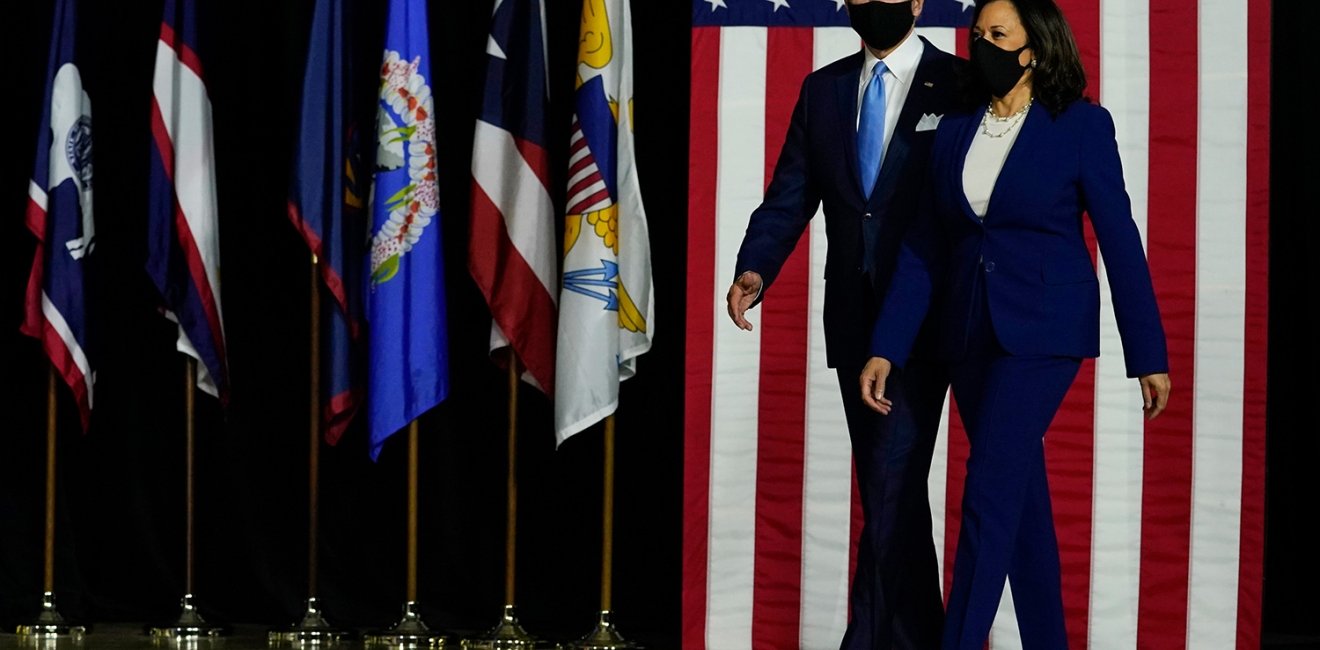Haleh Esfandiari- MEP Director Emerita and Fellow
High Expectations in a Changing Landscape
President Elect Joe Biden is not a stranger to the MENA region. During his long career he has not only visited many countries there, but he has witnessed major upheavals and he knows members of the leadership.
But the landscape of the region has changed. The rapprochement between the UAE, Bahrain, Sudan and Israel, brokered by the U.S. with the tacit agreement of Saudi Arabia, has led to the marginalization of the Palestinian issue and reflects the concern of many Arab states regarding Iran’s nuclear program and its regional aspirations. These states resent, even fear the presence and influence of Iran in Iraq, Lebanon, Syria, and Yemen. Meanwhile, there remain millions of internally displaced people and refugees from the war-torn areas, representing a collective humanitarian crisis.
The Middle East will confront President Biden with nothing but challenges. The expectations from local actors for the new administration will be very high. Regional states need help fighting the coronavirus. Countries like Lebanon, Iraq, Jordan, and Egypt will expect support and financial assistance to get back on their feet. Israel will want its special relationship with the United States to continue and the fait accompli regarding the Palestinians and the settlements on the West Bank to be acknowledged. Iran will expect the U.S. to return to the JCPOA and for all the sanctions imposed by the Trump administration to be lifted. The assassination of Iran’s leading scientist, Mohsen Fakhrizadeh, may incline the Iranians to postpone negotiations with the United States until after their own presidential election in June 2021. Saudi Arabia and the Gulf states will wish to see their close relationship with the US and access to American armaments to continue, and for Iran to be contained.
But what do the peoples in the countries of the MENA region expect from a President Biden? With few exceptions, most of the people live under autocratic regimes and will want the United States to pressure their governments to show respect for human rights and to free political prisoners and dissidents. They want to see an America again that is an advocate for free and fair elections, a free press, an independent judiciary, and for women’s rights, minority rights, and religious liberty. They want the US to speak out against corruption. They wish for America to help improve economic conditions in their countries and to facilitate the return of the refugees. All this—and more.
Does anyone envy the task facing President Biden?
Robin Wright- USIP-Wilson Center Distinguished Fellow
Biden, Been There Before, Now Has to Do It in the Mideast
Biden has more foreign policy expertise than any American president-elect. He knows the world, its political systems, and its leaders personally; he’s traveled six continents and many war zones; he cares about strengthening diplomatic alliances, economic recovery and solving military conflicts. His foreign policy will be built on principle but be pragmatic in practice. Biden will approach the greatest domestic challenges—the COVID-19 pandemic and the economic crisis—through a global prism too. After that, the Middle East may be further down his list of priorities—after China, Russia, transatlantic ties, and the future of international treaties, ranging from arms control to climate.
On Iran, Biden has vowed to return to the 2015 nuclear deal but almost certainly with modifications and updates, especially on dates when limits imposed on Iran’s nuclear program expire. Iran also has demands, including compensation for economic hardships imposed by the Trump administration’s “maximum pressure” sanctions. Tehran, which will be diverted by its own presidential election in June, had proposed getting modifications ratified by the Senate (and Iran’s parliament too) so the future of the deal isn’t determined by politics. Making progress could be more complicated than simply saying that the U.S. will rejoin the JCPOA, especially if Republicans still control the Senate.
Biden’s wish list, given his past positions, would also include stabilizing Iraq, a Mideast peace deal that includes the Palestinians, and more democratic policies and participation across the region so jihadism loses its attraction. But the prospects of major progress on these and other issues seems unlikely in the next couple of years. Even with his vast experience, Biden and his team don’t have the bandwidth to delve deeply into these longstanding challenges amid other crises.
Countries that had tight ties with the Trump administration are likely to be nervous about their status or sway under Biden, who is less likely to look the other way if an ally murders a dissident, as Saudi Arabia did with Jamal Khashoggi, or engages in mass human rights violations, as President El Sisi has done in Egypt. The Palestinians will hope for an ally in Biden after being abandoned by Trump. Several Arab countries—notably the fledgling democracy in Tunisia, the fragile state of Iraq, and the failing state of Lebanon—will want financial and political support.
David Ottaway - Middle East Fellow
Negotiating with Iran and Addressing Gulf Expectations
Iran looms as President-Elect Biden's first and most pressing Middle East challenge upon taking office in January 2021. It has renewed producing and stockpiling enriched uranium and turned on its most advanced centrifuges to produce more and much faster in response to President Trump’s withdrawal from the 2015 Iranian nuclear arms deal. Biden has proposed renegotiating the deal on terms Iran is almost certain to reject, leaving him with the prospect of a U.S.-Iranian military confrontation down the road. This could very well be triggered far sooner by the death of U.S. soldiers or diplomats from renewed attacks on them from Iran’s militia proxies in Iraq.
Biden seems likely to follow President Trump’s policy of reducing the U.S. involvement to a minimum in the Middle East’s “forever wars.” He seems certain to support Israel’s push to find more peace partners among the Arab states after its breakthrough agreements with the UAE, Bahrain and Sudan. Saudi Arabia, seen as the ultimate Israeli prize, may well follow suit—unless the Israeli push to expand settlements on the West Bank, or declare their outright annexation, upends this process. Biden’s promised efforts to revive negotiations between Israel and the Palestinians for a two-state solution seem certain to run into ever stiffer resistance from Israeli leaders and paralyzing disagreements among Palestinian ones.
Elsewhere, Biden faces just as much resistance from America’s closest Arab partners to his promised revival of democracy and human rights promotion in his foreign policy; highlighted by his call for a “Summit for Democracy” within his first year of taking office. Saudi Arabia and Egypt led the backlash to President George W. Bush’s failed “Freedom Agenda” during his first term in office (2001-2005), and they seem certain to play the same role in seeking to thwart Biden’s version of this same agenda.
Marina Ottaway- Middle East Fellow
A new Framework for American Middle East Policy
President-Elect Biden faces urgent challenges in specific countries, but even more importantly, a fundamental need to rethink the importance of the Middle East to US interests. In Iran, Biden needs to revive the diplomatic efforts that led to the JCPOA in 2015 under President Barack Obama. Returning to diplomacy with Iran will not be easy, but it is the only alternative to the present threat of open conflict. Biden also needs to restore some balance in the US position on the Israeli-Palestinian conflict, where Trump enabled Israel to take unilateral steps detrimental to Palestinian interests.
Most importantly, Biden faces the urgent need to re-evaluate the importance of the Middle East to the United States and move toward policies that reflect that importance. Both the Obama and the Trump administrations judged the importance of the Middle East to be decreasing, yet the region still consumes disproportionate US diplomatic and military resources, with policies decided on an ad hoc basis, without an overall framework. The next administration needs to provide one.
Middle East countries have only one common expectation: that the Biden administrations set a less erratic course. Beyond that, there are widespread differences: countries like Saudi Arabia and Egypt, whose leaders developed close relations with Trump and are leery of Biden. Others take a cautious wait-and-see attitude. And while many Middle Eastern countries are afraid Biden will pivot to another part of the world and neglect them, they do not want deep U.S. involvement, either, given the history of failed U.S. interventions and the internal divisions such involvement would deepen.
Amy Austin Holmes - Fellow
To Ensure Survival of Yezidis and Christians, a Turkish-Kurdish Peace Deal is Necessary
In terms of population size alone, the “Kurdish issue” is one of the largest conflicts in the Middle East. It is also one of the most protracted armed conflicts in the world, with Kurdish insurgencies stretching back over a century. Despite its constancy, the Kurdish question has never received adequate attention from the United States. The Trump Administration’s policy was skewed toward Turkish interests – even after Michael Flynn departed as National Security Adviser due to revelations of his ties to Turkish officials. This resulted in disastrous foreign policy decisions that undermined US security interests, including the partial withdrawal of US troops from Syria that expanded the influence of Putin and Assad.
Turkish President Erdogan recognized the need for a political settlement and oversaw peace negotiations with the PKK between 2012-2015. Soon after the talks broke down however, the Turkish military stepped up its interventions in both Syria and Iraq. As a result, hundreds of thousands of Syria civilians were forcibly displaced including Arabs, Yezidis, Assyrians, Syriacs, Armenians, as well as Kurds with no affiliation to the PKK. In the Kurdistan Region of Iraq, hundreds of villages have been effectively depopulated because of recurrent fighting in the border areas. Even Sinjar, the ancestral homeland of the Yezidis in western Iraq, has been hit by Turkish airstrikes. This is no longer a small insurgency or civil war confined to the Turkish military and the PKK, but encompasses virtually all the religious and ethnic groups in the region.
If the Biden administration makes resolving this conflict a priority, it could be the key to unlocking a number of interrelated challenges. The convening of a diverse coalition of stakeholders to mediate the conflict requires American leadership. Just as Turkey came to accept and even profit from trade relations with the Kurdistan Region of Iraq, Turkish entrepreneurs could benefit handsomely from the reconstruction of North and East Syria. For the market to kick in, increased diplomacy and new thinking are needed. The complexity of the issue will require a whole-of-government approach and a willingness to design evidence-based policies.
Our Kurdish military partners and communities victimized by years of ISIS rule and Turkish military incursions will look to the U.S. to provide a framework for their recovery and continued development. A peaceful resolution to the Turkish-Kurdish-Syrian-Iraqi conflict would not only bring stability, but could also open the door to greater political pluralism in Turkey, Northeast Syria, and the Kurdistan Region of Iraq. This would help ensure the enduring defeat of ISIS, set the groundwork for real economic development, and make it possible for endangered minorities to fully recover after the devastation wrought by ISIS. Yezidi and Christian communities have inhabited Turkey, Syria, and Iraq for more than a millennium. Their continued survival depends on the resolution of the Turkish-Kurdish conflict.
Asher Orkaby - Fellow
The Leader-Constituent Gap in Middle East Relations
“Death to America!” is a popular Houthi slogan chanted on the streets of Yemen. Of the millions chanting, few have ever met an American, and their perception of this seemingly faraway country is filtered through mass media messaging, controlled by the radical Houthi administration since 2014. While the same words might be chanted, the slogan has two very different meanings and connotations depending on the speaker: for the Houthi leadership it is a politically-expedient statement of ideology, while for the Yemeni population it is an expression of disdain for incessant bombings and blockades regularly attributed to the “Saudi-American Aggression”.
Although Houthi ideology is inherently racist and its leadership is guilty of numerous domestic human rights violations, responding to the war in Yemen by designating the movement as a terrorist organization ignores the fundamental challenges facing the country. The war in Yemen is not a Saudi-Iranian proxy conflict which could lead to a political solution, but rather is a religious and ideological struggle for the identity of the Yemeni state without a clear solution. The Yemeni crisis cannot be solved without looking beyond the oversimplified bipolar regional divisions and a leadership that does not represent its constituents. Rather than designations, Yemen needs assistance repairing crumbling state infrastructure that has fallen victim to decades of political corruption and recent years of conflict. A new era of American-led postwar reconstruction will appeal directly to the Yemeni people.
In Yemen, and across the Middle East, there is a distinctive gap between leaders and the general population. In helping to bridge this gap in foreign relations, the Biden administration should increase platforms of interaction between Americans and Middle Easterners through trade, sports, and education. This form of cultural soft power can demystify “America”, transforming hatred into fruitful cooperation.
Dalia Dassa Kaye – Fellow
A Surprising Pivot: Invest in the People
The near-term future for the Middle East looks grim. From Syria to Yemen to Libya, the region’s conflicts have triggered grave humanitarian crises, destroying lives and livelihoods. Such conflicts are likely to continue ravaging the region, with spillovers into Europe and beyond as regional wars fuel mass migration, arms proliferation and violent extremism. With the United States prioritizing economic challenges at home and competition with China and Russia abroad, and with its decreased reliance on Middle East oil, many in the region may not expect renewed American engagement to tamp down conflict. Nor may they want it given the U.S. track record, where many see American Middle East policy as a problem, not a solution.
Few may expect a new U.S. administration to drastically alter longstanding American policy, particularly when it comes to military support for partners and confronting Iran, including major arms packages to the Arab states of the Gulf, which are now linked not only to Iran but also to new normalization agreements with Israel.
The Biden administration, however, could surprise many actors in subtle but meaningful ways. It could, for instance, signal principled and long-term investment in the region’s people that transcends the short-sighted, transactional nature of America’s relationships with their leaders. Transactional U.S. policies are not new, but the Trump administration put them into overdrive, emboldening states to pursue aggressive military actions that aggravated regional conflicts. The Trump administration’s Iran policies further escalated tensions while producing counterproductive results—a more advanced Iranian nuclear program and more destabilizing regional activities.
Working against expectations, the Biden administration could shake up American policies, investing serious diplomatic resources into a strategic vision for the region that genuinely promotes regional stability, de-escalation, growth, and better governance so critical to preventing future conflict. The people of the region may not be holding their breath, and some leaders may actively oppose a change of course. But perhaps the time has come for better surprises in the region than new wars.
Merissa Khurma – Middle East Program Manager
Addressing New Dynamics of Change in MENA
A few days before the U.S. presidential elections, the Arab Barometer published its findings about the MENA region’s preferred presidential candidate: Joe Biden. The poll also showed unfavorable views of President Donald Trump. However, these findings did not reflect the views of the entire region, as the poll was conducted in only five Arab countries: Jordan, Lebanon, Algeria, Morocco, and Tunisia. The Arab states of the Gulf were not included.
Were they polled, we might have seen more variation reflecting changes in the region’s geopolitical landscape in the last four years. These new changes include a realignment in regional power dynamics, with the United Arab Emirates in particular emerging as a prominent player across the Middle East. Followed by Bahrain, the UAE created a new pathway to peace with Israel, circumventing the Arab Peace Initiative of 2002 that made normalizing relations with Israel conditional on ending the 1967 occupation of Palestinian Territories and establishing an independent Palestinian state. These two peace agreements along with Saudi Arabia’s softening position toward Israel mark a shift in regional political and security alliances, bringing the Arab states of the Gulf closer to Israel against Iran, aligning with the Trump administration’s maximum pressure policy. As tensions rise further between Iran and the United States, particularly with the strategically timed assassination of Iran’s top nuclear scientist, the space for a return towards U.S.-Iranian talks is shrinking for the incoming administration.
Beyond the standoff with Iran, the transformed region Biden will face includes intra-GCC infighting. The stringent blockade imposed on Qatar in 2017 by Saudi Arabia, the UAE, Bahrain, and Egypt has hardly loosened. Thus far, various mediation attempts by neutral GCC actors Kuwait and Oman have failed to ease these tensions. Recent political chatter about Saudi-Qatari reconciliation remains unclear, obscuring the future of the GCC.
Finally, and particularly given the impact of the COVID-19 pandemic and sharp declines in oil prices, the MENA region is certainly worse off on the socioeconomic front than it was four years ago, rendering key countries such as Jordan, Tunisia, Lebanon and Egypt more dependent on U.S. support. These dire socioeconomic conditions, accompanied by more limited freedoms and human rights abuses in many countries, have triggered a new and durable wave of protests and strengthened mass movements in the pursuit of change, reform and pluralism.
Assessing how these new dynamics of change can be addressed in the Biden administration with all the domestic issues the president-elect must confront will prove a cumbersome task.
Alexander Farley - Middle East Program Associate
Remove Political Obstacles to Trade
The Biden administration will have to develop a consistent policy to a region facing numerous, simultaneous political transitions. Yemen, Syria, and Libya are all in a state of open conflict, while Lebanon, Iraq, Algeria, and Sudan all faced massive public uprisings against the established leadership within the past two years. Tunisia’s 10-year transition to democracy is threatened by stagnations and division. State corruption and massive unemployment are common threads running through the heart of all these upheavals, emphasizing the simultaneous challenge of improving governance and economic competitiveness.
Meanwhile, the wealthier Gulf states are also struggling with diversification and remain hampered by political divisions. Though diversification efforts have been ongoing for more than a decade, the COVID-19 pandemic and oil price crash in March severely impacted their economies, which rely heavily on international travel and hydrocarbon exports. Oman’s growing budget deficits may require financial rescue from its neighbors, Kuwait is depleting its sovereign wealth fund to cover short term deficits, Saudi Arabia is increasing taxes on citizens, and Qatar remains economically and politically embargoed by its neighbors. All these developments mark a fundamental shift in the Gulf rentier model, which will be forced to reckon with a greater need for integration, labor competitiveness, and placing the state’s financial burdens on citizens and businesses.
Countries in the region will look to the Biden administration to support coronavirus response and offer cash for economic stabilization. However, there are huge opportunities to encourage bilateral and multilateral trade deals as a post-pandemic recovery plan, also opening opportunities for the American Private sector. Administration support could help American companies navigate political and regulatory barriers and maximize the social impacts of investments. American education standards could form the basis of a much-needed education revolution in the region and American technology could become the foundation of its economic modernization. Without integration and regulatory coordination, the region simply won’t develop the economy of scale necessary to absorb the surplus labor force and American businesses will get fewer returns from investments.
The views expressed in these articles are those of the authors and do not reflect an official position of the Wilson Center.














